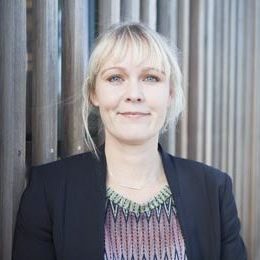
Anna Eriksson
Samordnare Utbildning och Forskningsprojekt
Department of Software Engineering, Room J2626
Anna Eriksson is an experienced Project Manager with a demonstrated history of working in the higher education industry. Skilled in managing and controlling project, Lecturing, Development of Online teaching and education. Strong program and project management professional with a Master’s degree focused in Sociology from Lund University. Anna began her employment at BTH in 2009, initially as a teacher assistant and then as a lecturer in Sociology with a specific focus on qualitative and quantitative methods in social science. In addition, she has been an executive director for Confucius Institute at BTH between 2011-2016, providing overall management for the institute’s development of courses and activities. In 2015, she joined the Department of Software Engineering and are working with coordination of research projects and collaboration between academia and industry. She’s passionate about lifelong learning and how to improve and develop web-based courses both for academia and industry.
Degrees
- 2016 – Master of Science in Sociology – Lund University
- 2010 – Bachelor of Science in Sociology – Blekinge Institute of Technology
Work and appointments
- 2015 – present – Project coordinator – Department of Software Engineering, BTH
- 2011 – 2016 – Executive Director, Confucius Institute at BTH
- 2009 – 2013 – Lecturer, Sociology, Institution of Management, BTH
- 2002 – 2005 – Professional fisherman on a trawler, Aalesund, Norway
Teaching/courses
- Sociology, Basic course, 30 ECTS – Basic sociological concepts, theory and methodology as well as the relationship between individual, group and society.
- Qualitative sociological methods, 7,5 ECTS – Data collection methods such as interviews, observations, case study and grounded theory comprised the main elements of the course, together with methods of analysis.
- Quantitative Sociological Methods 7,5 ECTS – The main elements of the course were structured observation and survey methods along with the epistemology of quantitative research and basic statistical analysis for social science.
Development and production of digital material for online courses –
- Introduction to Chinese, 7,5 credits
- Introduction to Chinese II, 7,5 credits
- Basic course in Chinese, 15 credits
- Continuous Requirements Engineering and Products Management 7,5 credits
- Evidence-based process change and improvement 7,5 credits
- Behavioural Software Engineering 2,5 credits
- Adaptive Lean Software testing 7,5 credits
- Distributed Development and Outsourcing 2,5 credits
- Large-scale software testing 2,5 credits
Projects
- SERT – SERT – Software Engineering ReThought is a groundbreaking research project with the aim to take on the next generation challenges facing companies developing software-intensive systems and products. SERT is blazing the road introducing 3:rd generation empirical software engineering – denoting close co-production of pragmatic problem-solving in close collaboration with our industrial partners as we perform engineering research into topics critical for engineering and business success. SERTs formulation of 3:rd generation empirical software engineering will utilize related knowledge areas as catalysts to solve challenges. Value-based engineering, Data-driven evidence based engineering, and Human-based development will complement software engineering competence in an integrated eco-system of competence focused on the challenges at hand. All areas in software engineering, ranging from inception, realization to evolution are part of the research venture – reflecting that companies need solutions covering their entire ecosystem.
- PLEng – PLEng (Professional Licentiate of Engineering School) is a concept of integrated research school that enables the industry to develop skills-based specialists and objective problem solvers. The research school, which is conducted for 3 years part-time, focuses on developing applied research and innovative solutions to specific problems. Participants in PLEng’s combine their research studies in parallel with work in their respective companies, which means a more flexible form compared with traditional research studies.
- PROMPT – a national educational initiative in cooperation with several academic parties and several leading Swedish industrial companies and organizations. The goal is to guarantee the supply of advanced software competencies and innovativeness. PROMPT is offering university courses on advanced level, directed towards professionals. The courses are web-based, tailored to fit in combination with work, and free of charge for both the student and the company. PROMPT is funded by the Swedish Knowledge Foundation and the partners in the consortium.
- 22nd IEEE Requirements Engineering Conference RE’14 – Coordination, organization and implementation of the 22nd IEEE RE’14 Conference at BTH. The conference was an immense success, with an extensive program of interest to both academia and industry. Over 400 participants joined from all over the world for the 3 days main conference and 2 days full of WS and seminars.
- Industrial Economy Conference INDEK 2011 – Organization, planning and implementation of the 3rd Swedish Industrial Economy Conference in Karlskrona, Blekinge Institute of Technology.
Conference presentations/WS/courses related to China studies and Confucius Institute
- “Chinese Language Teaching and MOOC – a necessity in the sustainable development for CIs” – Hanban, 8th Confucius Institute Conference, Beijing, 2013.
- “Explore China – a co-project with local municipalities, educational departments and international organizations” – Hanban Conference, Minsk, 2013.
- “How to establish online courses for Chinese language testing” – Hanban Conf. Vilnius, 2013.
- “Implementation of Internet based Chinese Language Testing” – 7th Confucius Institute Conference, Beijing, 2012.
- 2-week Workshop for Confucius Institute Directors, Shanghai 2013.